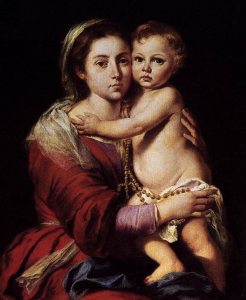First Saturday Meditation: Blasphemies against Our Lady’s Virginity
 On the 4th February 2017, we will celebrate the second of the Five First Saturdays in reparation to Our Lady’s Immaculate Heart. This month we will meditate on the second blasphemy that Our Lord listed which is the attacks, or disbelief, on Our Lady’s Virginity.
On the 4th February 2017, we will celebrate the second of the Five First Saturdays in reparation to Our Lady’s Immaculate Heart. This month we will meditate on the second blasphemy that Our Lord listed which is the attacks, or disbelief, on Our Lady’s Virginity.
From its very beginnings, the Church has always believed in Our Lady’s perpetual virginity before, during and after Child birth. Indeed, the Church refers to Our Lady under the ancient title of the Aeiparthenos or the Ever – Virgin Mary (cfr. CCC 499).
Before and During Childbirth
How is it possible that the Church declares that Mary was a Virgin both before and during Childbirth? In first place, we can review the words of the Scriptures. The prophecy of Isaiah announcing the birth of the Messiah said, “Behold, a virgin shall conceive and bear a Son, and shall call his name Emmanuel” (Is 7:14). The prophet says that “the Virgin shall conceive” and then adds “and bear a Son”. The sign of the Messiah is the pregnant and child bearing Virgin. Our Lady’s Virginal integrity was not compromised when she conceived and gave birth to her Son.
However, perhaps even more compelling is the testimony of Mary herself who asks the Angel how the conception of her Son will take place as, “I have no knowledge of man” (Lk 1:34) or, in other words, because she is a Virgin.
 A sermon from the Council of Ephesus explains how it is possible for Our Lady to be a Virgin even when giving birth:
A sermon from the Council of Ephesus explains how it is possible for Our Lady to be a Virgin even when giving birth:
“Whosoever brings forth mere flesh, ceases to be a virgin. But since she gave birth to the Word made flesh, God safeguarded her virginity so as to manifest His Word, by which Word He thus manifested Himself: for neither does our word, when brought forth, corrupt the mind; nor does God, the substantial Word, deigning to be born, destroy virginity.” (Council of Ephesus (P. III, Cap. ix))
Mary remained a Virgin after the birth of the Lord
The Church teaches Our Lady remained a Virgin even after the birth of the Lord. Those who doubt this truth frequently cite the “brothers” of Jesus mentioned in St Mathew’s Gospel (Mt 12:46; 13:55-56) or the fact that Mary gave birth to her “first born Son” (Mt 1:24-25). These objections are simply explained because in ancient Hebrew there was no word for cousin and so “brother” was used to relate to cousins, fellow countrymen or even close friends. It did not necessarily mean that they were blood brothers. In Israel, the “first born” was offered to the Lord but it did not imply that there was necessarily a second child. Perhaps this is clearly highlighted at the foot of the cross when Our Lord asks St John to take care of His Mother ( Jn 19:26-27) because if there were other children they would have taken care of Our Lady.
The importance of this doctrine
The importance of Mary’s perpetual virginity comes to the fact that it is intrinsic to the Lord’s Incarnation. God could have become man in any way he chose. However, God chose be born of a virgin. It is a sign that emphasises the absolute initiative of God in bringing about man’s Salvation.
What are the blasphemies against Our Lady’s Virginity for which we are to offer reparation?
 1. Refusal to accept that Our Lord was born of a Virgin
1. Refusal to accept that Our Lord was born of a Virgin
2. Refusal to accept that Our Lady remained a Virgin during and after child-birth.
3. Erroneous belief that Our Lady had other children
4. Refusal to belief that Our Lady and St Joseph lived a virginal marriage
5. Refutation that Our Lady preserved the inner sanctorum of the Most High
Ways to Make Reparation to Our Lady’s Immaculate heart
Offer this first Saturday in reparation for the blasphemies against Our Lady’s perpetual virginity.
Meditate on St Augustine’s celebrated teaching: “Mary remained a virgin in conceiving her Son, a virgin in giving birth to Him, a virgin in carrying Him, a virgin in nursing Him at her breast, always a virgin” (Serm 186, 1)





















